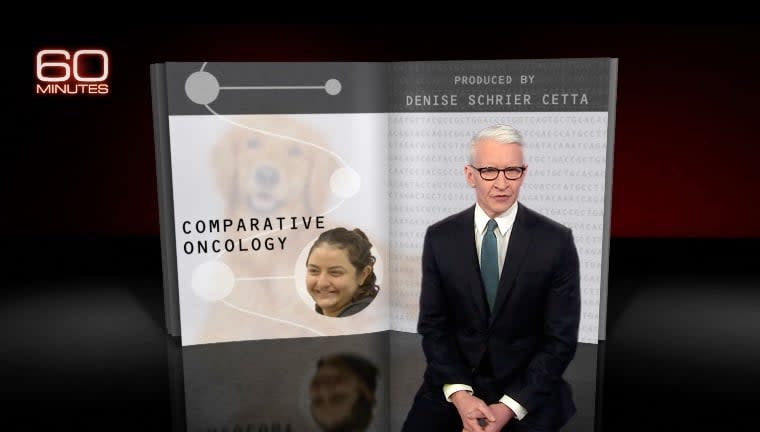Comparative Oncology is saving dogs and humans from cancer

- Oops!Something went wrong.Please try again later.
- Oops!Something went wrong.Please try again later.
(Photo Credit: CBS News)
In a fascinating profile from CBS, Anderson Cooper spoke to researchers about cancer, comparative oncology, and how dogs are helping fight cancer for themselves and their owners.
Last summer, Cooper and his crew went to a dog show in Norwalk, Connecticut. Although not the first place you’d name when thinking about cancer, this wasn’t just any dog show. Here, scientists from the National Institutes of Health were collecting DNA samples from all the breeds.
Why? According to Elaine Ostrander, a senior geneticist at NIH, because “ we are studying human disease, and we’re doing it through dogs.”
How dogs became a tool for cancer research
According to the National Library of Medicine, comparative oncology “ provides novel opportunities for current and future veterinary and human cancer patients.” Using this method, scientists can integrate naturally occurring cancers in certain animals into cancer research in humans.
In particular, dogs are the best model for this due to their “strong anatomic and physiologic similarities”. Previous studies, including one that also took place in Norwalk, have so far proved largely successful. In fact, comparative oncology is so promising that a consortium consisting of 20 universities has formed to coordinate research.
However, it’s not just biology that makes dogs useful for cancer research. After centuries of living alongside humans, dogs’ diets and lifestyles greatly resemble our own.
As Ostrander told Anderson Cooper, “ [Dogs] eat our food. They’re exposed to the same environmental pollutants. But they also have all the same genes that we do. And they have mutations in those genes that make them susceptible to everything you and I get – whether it’s diabetes or cancer or neuromuscular diseases. Everything humans get, dogs get.”
Interestingly, Ostrander also said it’s easier to study dogs because they’ve been bred for specific traits for 200 years. As a result, their genetic codes are easier to decipher because only a few genes dictate their physical diversity.
Comparative oncology’s future is getting brighter
Cancer research is truly something every dog owner should care about. According to some statistics, one in four dogs over 2 years old will die from cancer. Thankfully, comparative oncology is already yielding incredible new treatments. For example, a new canine cancer detection test that uses cutting-edge liquid biopsy technology to detect cancer in dogs quickly and accurately.
The post Comparative Oncology is saving dogs and humans from cancer appeared first on DogTime.

